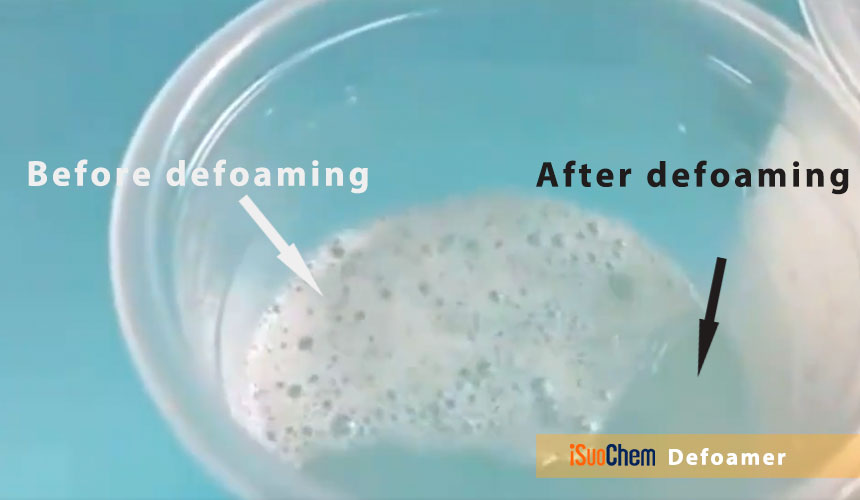The Duty of Defoamers in Enhancing Product Top Quality and Performance
Defoamers offer as crucial additives that alleviate this concern, guaranteeing smoother manufacturing operations while enhancing the useful and visual characteristics of the last products. The selection of the suitable defoamer can be critical to attaining optimal outcomes, increasing vital concerns about solution compatibility and performance metrics that merit additional expedition.
Comprehending Defoamers
Understanding the duty of defoamers is necessary for keeping product top quality across numerous industries. Defoamers are chemical ingredients designed to minimize and prevent the formation of foam in fluid systems, which can adversely affect procedures such as mixing, filling, and surface area tension. Foaming can result in ineffectiveness, product defects, and jeopardized aesthetic appeal, making defoamers an important part in producing operations.
In commercial applications, defoamers aid to improve product consistency and security. For example, in the paint and coverings sector, foam can interfere with the application process and the final surface. In food and beverage production, excessive foam can prevent bottling and product packaging efficiency. The effective use defoamers not just ensures smoother manufacturing procedures but also adds to exceptional product performance.
Furthermore, the selection and formula of a defoamer need to line up with specific application requirements, such as compatibility with various other components, effectiveness under differing temperature level and pH conditions, and prospective governing restraints. Eventually, understanding defoamers' features and their importance in various solutions is vital for maximizing production and guaranteeing the best end products.
Sorts Of Defoamers
Defoamers can be categorized right into several types based upon their structure and device of activity. The key kinds consist of silicone-based, non-silicone organic, and inorganic defoamers.
Silicone-based defoamers are among one of the most reliable, mainly as a result of their capability to spread quickly on the fluid surface area and interrupt foam formation. Their unique chemical structure permits premium security, making them suitable for high-temperature applications and atmospheres with differing pH degrees.
Non-silicone organic defoamers, frequently made up of all-natural oils or fatty acids, are valued for their biodegradability and lower poisoning. These are commonly utilized in food and beverage applications where security and environmental impact are paramount.
Inorganic defoamers, which consist of compounds like talc or calcium carbonate, act by increasing the density of the liquid, thereby decreasing foam stability. They are often made use of in industrial procedures where compatibility with various other products is not a concern.
Each sort of defoamer has distinctive benefits and limitations, enabling customized options depending upon the specific foaming concerns run into in different applications. Understanding these differences is vital for enhancing performance and accomplishing wanted item quality.
Applications Across Industries
Many industries take advantage of defoamers to enhance product high quality and functional efficiency. In the food and beverage market, defoamers are essential in procedures such as developing and dairy products production to stop foam formation, which can lead to inefficiencies and item incongruity. By regulating foam, suppliers can make certain far better yield and a much more consistent product.
In the pharmaceutical sector, defoamers play a crucial function in the formulation of fluid drugs, where too much foam can restrain blending and precise application. Their usage aids preserve the honesty of the formulas and assists in smoother production processes.
The paint and layers market also counts on defoamers to boost the hop over to these guys efficiency of items throughout application. By lessening foam, these ingredients guarantee a smoother surface and improve the aesthetic top qualities of the end product.

Advantages of Utilizing Defoamers
While the application of defoamers varies across industries, their benefits regularly improve item quality and procedure effectiveness. One substantial benefit is the decrease of foam formation throughout producing processes, which can or else cause production delays and disparities in product quality. By reducing foam, defoamers make it possible for a smoother circulation of materials, helping with much more efficient operations and minimizing the likelihood of devices malfunctions.
Additionally, making use of defoamers can boost the appearance and appearance of last products. In fields such as coatings, paints, and food handling, extreme foam can jeopardize the aesthetic appearances and general quality, while the ideal defoamer application makes sure an uniform coating and desirable attributes. Defoamers can contribute to cost savings by decreasing waste during manufacturing and maximizing the usage of raw products.

Picking the Right Defoamer
Selecting the best defoamer is critical for optimizing production procedures and guaranteeing item quality. The option of defoamer affects not only the performance of foam control however also the overall efficiency qualities of the last product. Variables to take into consideration consist of the sort of application, the chemistry of the formulation, and the environmental conditions under which the item will certainly be made use of.
Various markets might require certain defoamer kinds, such as silicone-based, organic, or polymeric helpful hints defoamers. Comprehending the compatibility of the defoamer with the main active ingredients is necessary to prevent unfavorable reactions that might jeopardize product stability. Furthermore, the defoamer's efficiency home in different temperature levels and pH degrees should be examined to make certain consistent performance.
Testing the defoamer in small applications can provide important insights into its performance and viability. Consideration of regulative conformity, particularly in food, drugs, and cosmetics, is critical in picking a defoamer. Eventually, an extensive assessment of these aspects will cause the selection of a defoamer that not only controls foam properly however also improves the quality and efficiency of the final item.
Conclusion

In conclusion, defoamers are vital additives that dramatically improve item top quality and efficiency across different sectors. The tactical choice and application of defoamers lead to cost financial savings, maximized resource use, and raised client complete satisfaction.
Foaming can lead to inadequacies, product problems, and compromised visual charm, making defoamers an essential element in manufacturing operations.

Comments on “Why Defoamers Are Essential in Water Treatment and Waste Management”